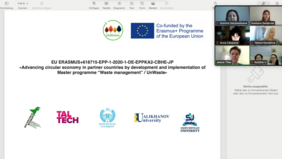All six partners of the project met online on 23rd of December. The representatives of Tallinn University of Technology, Wismar University of Applied Sciences, Akhmet Baitursynuly Kostanay Regional University, S. Seifullin Kazakh Agro Technical Research University and Kokshetau University named after Sh. Ualikhanov discussed the project results. In their contributions, the three Kazakh team leaders emphasised the importance of the ‘UnWaste’ project for the development of the universities' academic potential and the relevance of introducing a master's programme in waste management. The project is an important step towards promoting the concept of circular economy and strengthening the educational potential of universities.
An important part of the conference was the discussion on the preparation of the final reports. Svetlana Saidensal and guest expert Anna Svirina gave recommendations on their structure and content. However, it is already clear that all project objectives have been fully achieved. The contacts established between the universities as a result of the project form a solid basis for future projects. The official conclusion of the project will take place on 14th of January 2025.
The overall aim of the project is to influence the current situation by developing engineering-focused waste management curricula at Master's level and to raise awareness of the circular economy by developing new curricula in higher education institutions. This project would enhance practice-orientated learning to ensure the parallel development of soft skills (teamwork, communication, management, decision-making) and hard skills (waste management) and provide future employers with evidence of problem-solving. Main target group: Engineering students. Indirect beneficiaries of the project are: Industry partners, non-profit organisations and policymakers.

